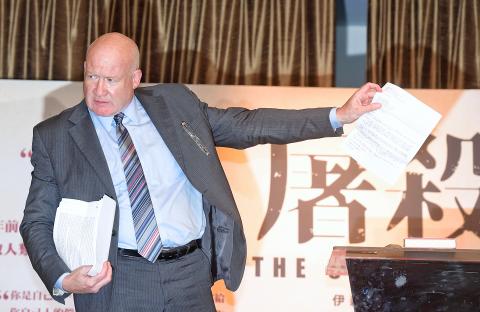Taipei Mayor Ko Wen-je’s (柯文哲) election campaign office yesterday said baseless accusations should not be made for electoral gains and asked US author Ethan Gutmann to explain why he changed his attitude about accusations that Ko was involved in organ harvesting in China.
The office made the remarks after a news conference in Taipei yesterday, when Gutmann answered questions about his 2014 book The Slaughter: Mass Killings, Organ Harvesting, and China’s Secret Solution to Its Dissident Problem in which Ko was one of the interviewees.
Wu Hsiang-hui (吳祥輝), a political pundit and owner of Butterfly Orchid Cultural Creativity who plans to publish a Chinese-language version of the book, on Sept. 3 took out a full-page ad in the Chinese-language Liberty Times (the Taipei Times’ sister newspaper) featuring excerpts from the book and claimed that Ko knew that many organs transplanted in China came from Falun Gong members.

Photo: Huang Yao-cheng, Taipei Times
Ko the same day said that Gutmann had already clarified in a written statement in 2014 that Ko was not acting as an “organ broker” or was in any way involved with purchasing organs.
Wu on Sept. 4 said that he believes what Gutmann wrote was the truth, adding that he would sue Ko for damaging his reputation.
After several people commented on Gutmann’s Facebook page, the author shared a link to a 2014 video, in which he explains his interviews and e-mail correspondence with Ko.
“In my book, I do not describe Dr Ko as an organ broker. I described him as a man of singular courage,” Gutmann said in the video, adding that Ko has created an electronic form that would identify the source of every organ and if Chinese doctors were required to use it, it would make the process transparent and hold doctors accountable.
However, in yesterday’s news conference, Gutmann was asked if he had changed his mind about Ko and answered “yes” when he was asked whether he thought Ko was a liar.
Gutmann showed a group photograph of Ko attending a conference on Extracorporeal Membrane Oxygenation training in China and said Ko had told him he knew about organ harvesting of Falun Gong members in 2005, but he had discovered that the conference took place only three months before he interviewed Ko.
“Dr Ko did not say explicitly [in the interview] what he did in the mainland,” Gutmann said, adding that Ko did not tell him whether he was making money or arranging for patients to receive organ transplants in China.
The best description he could come up with is that Ko was a “middleman,” Gutmann added.
“Ko was a potential conduit to Taiwanese patients,” he said, adding that this created a “perverse incentive” to harvest the organs of Falun Gong members.
Ko’s campaign office said Ko was working at National Taiwan University’s Intensive Care Unit at the time and did not see outpatients, adding that organ transplants must be conducted by a medical team, not a single doctor.
It also criticized those who are using the issue to hurt the medical community for electoral gain.

Alain Robert, known as the "French Spider-Man," praised Alex Honnold as exceptionally well-prepared after the US climber completed a free solo ascent of Taipei 101 yesterday. Robert said Honnold's ascent of the 508m-tall skyscraper in just more than one-and-a-half hours without using safety ropes or equipment was a remarkable achievement. "This is my life," he said in an interview conducted in French, adding that he liked the feeling of being "on the edge of danger." The 63-year-old Frenchman climbed Taipei 101 using ropes in December 2004, taking about four hours to reach the top. On a one-to-10 scale of difficulty, Robert said Taipei 101

A preclearance service to facilitate entry for people traveling to select airports in Japan would be available from Thursday next week to Feb. 25 at Taiwan Taoyuan International Airport, Taoyuan International Airport Corp (TIAC) said on Tuesday. The service was first made available to Taiwanese travelers throughout the winter vacation of 2024 and during the Lunar New Year holiday. In addition to flights to the Japanese cities of Hakodate, Asahikawa, Akita, Sendai, Niigata, Okayama, Takamatsu, Kumamoto and Kagoshima, the service would be available to travelers to Kobe and Oita. The service can be accessed by passengers of 15 flight routes operated by

Taiwanese and US defense groups are collaborating to introduce deployable, semi-autonomous manufacturing systems for drones and components in a boost to the nation’s supply chain resilience. Taiwan’s G-Tech Optroelectronics Corp subsidiary GTOC and the US’ Aerkomm Inc on Friday announced an agreement with fellow US-based Firestorm Lab to adopt the latter’s xCell, a technology featuring 3D printers fitted in 6.1m container units. The systems enable aerial platforms and parts to be produced in high volumes from dispersed nodes capable of rapid redeployment, to minimize the risk of enemy strikes and to meet field requirements, they said. Firestorm chief technology officer Ian Muceus said

MORE FALL: An investigation into one of Xi’s key cronies, part of a broader ‘anti-corruption’ drive, indicates that he might have a deep distrust in the military, an expert said China’s latest military purge underscores systemic risks in its shift from collective leadership to sole rule under Chinese President Xi Jinping (習近平), and could disrupt its chain of command and military capabilities, a national security official said yesterday. If decisionmaking within the Chinese Communist Party has become “irrational” under one-man rule, the Taiwan Strait and the regional situation must be approached with extreme caution, given unforeseen risks, they added. The anonymous official made the remarks as China’s Central Military Commission Vice Chairman Zhang Youxia (張又俠) and Joint Staff Department Chief of Staff Liu Zhenli (劉振立) were reportedly being investigated for suspected “serious